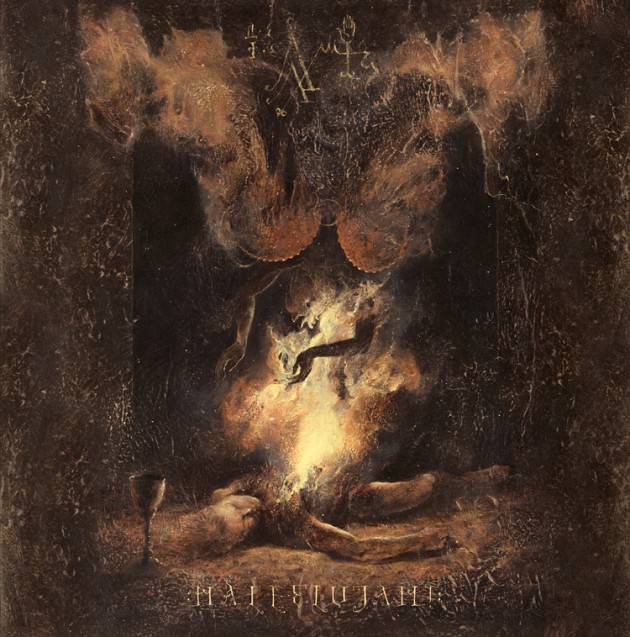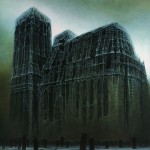Gevurah : Hallelujah!

Gevurah is a black metal band that requires a certain level of depth to capture properly in a record review. Sure, I could say the record is an exemplar of the musical diversity and richness of black metal in specific and extreme metal in general, combining fiery and intense blast beats and tremolo-picked sections with seasick dark psychedelia and chaotic dissonant doom riffs (replete with the occasional crackling distorted choir passage to boot). And this would be fair to say. Were the goal to simply encourage a listener to check out the record, those words would come easy and be brief. This is an excellent black metal record, not unsurprising given its release on Profound Lore, who’ve acquired near legendary status for consistently putting out high-quality metal albums. But it deserves something more.
Gevurah, sometimes rendered as “Geburah” due to the difficulties in transliterating Hebrew to Latin characters, is one of the sefirah of the Tree of Life in Qabbalah, the most predominant branch of Jewish mysticism and a major figure in the occult. The tree begins at the bottom with Malkut, the material world or the flesh of the human body, and goes up through eight further sefirah before reaching its apex again at Keter, or the undivided light of the godhead. It is then divided into two paths, the left and righthand paths, representing the twin lights of Lucifer and Christ, chaos and law, who are ultimately in union in the all-light of the Lord. Gevurah is on the left-hand path, in the demesne of Lucifer, and is representative of fire and passion and overflowing, the notion that by stoking inner fire and sacrificing one’s self to their passions’ greatest intensities they might reach higher toward the Lord.
It is at this point that the name of the band, of the record, and in fact of manner of the songs find themselves in union. Gevurah plays this to the hilt, from the animating black metal inferno of the opening track and “Un Feu Indomptible” (translation: Indomitable Fire), to the spacious darkness and quivering doom of “Temple Without Form” and “Lifting the Veils of Da’at.” The aesthetic elements of the occult, of the Qabbalah, and of Lucifer are not window dressing for otherwise generic black metal, but guides for how and where to utilize certain techniques, certain textures, certain moods. Their acumen extends beyond an on-the-nose wielding of aesthetic, however. It’s not as simple as “songs about fire are riffy, songs about water are spacy.” Instead, Gevurah uses fairly complex linear songstructures, letting songs breathe and swell and ignite and dissipate by their own volition. They don’t stack riff-salad chromatic avant garde riffs together in extended clusters, nor do they linger in doom or spaciousness for too long. A minute or two here, a transition there, and the mood of a song changes, or the song closes and opens up to a contrasting beginning of a new piece. They paid great attention to the shape of this record as a single piece, and it shows; it’s difficult to select one track and listen to it alone instead of sitting down and letting the whole of the work wash over you in a single hour-long sitting.
This is part of what makes writing about the record tricky. The fluidity of the songstructures makes the transition between tracks, at least for the first six of seven tracks, into only moderate blips in what otherwise feels like a single liturgical piece of ecstatic, sincere and theologically informed Lucifer worship. One gets the impression that the naming of the record Hallelujah! (a compound Hebrew word, “hallel” being a call to prayer and “Jah” being the name of the Lord) as well as ending the record on a 20-minute title track whose name is rendered in Hebrew is quite intentional.
This is an album of profound musical density whose final 20 minutes plays like a recapitulation of the entire record and has on its own as much density as some of the equal-length tracks Deathspell Omega dropped between installments of their own trilogy of Lucifer-worship theology records. What makes this album noteworthy is ultimately not the depth of research into the occult and Qabbalah that went into it, but the sincerity of its spirit. It is this earnestness, combined with the deftness of the playing and acumen of the songwriting, that lifts the record from what can otherwise be the cartoonish (if fun) moors of extreme metal occult gloom and doom. There is ecstasy here, sincere and total ecstasy, a wielding of occult knowledge to convey by sound the spirit of their thoughts and message even if the words are sometimes screamed into obscurity. The record breathes and bites and thrashes and sings. It’s terribly dense, but can wash over you. It can be either the beginning of a long road of investigating references and concepts, or it can be a cinematic and engrossing, enthralling, hour-long black metal piece, replete with a bevy of contrasting, mutually enriching moods.
Similar Albums:
 Wode – Wode
Wode – Wode
 Cobalt – Slow Forever
Cobalt – Slow Forever
 Ash Borer – Cold of Ages
Ash Borer – Cold of Ages
Langdon Hickman is listening to progressive rock and death metal. He currently resides in Virginia with his partner and their two pets.

